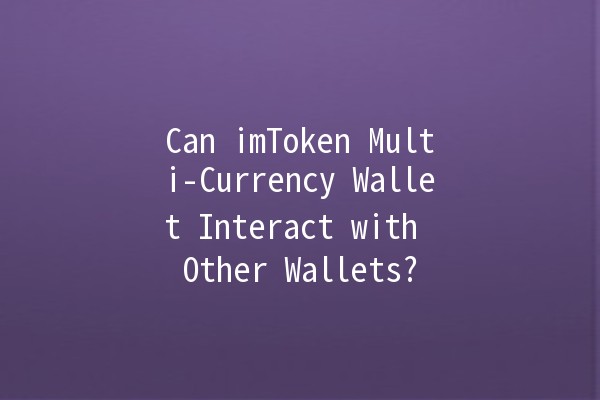In recent years, the rise of cryptocurrency has led to an increase in demand for secure and userfriendly wallets. Among these options, the imToken multicurrency wallet has gained attention for its robust features and ease of use. A frequent question that arises is whether imToken can interact with other wallets. In this article, we will delve into the capabilities of imToken, explore wallet interoperability in general, and offer practical tips to maximize productivity for cryptocurrency users.

Wallet interoperability refers to the ability of one cryptocurrency wallet to interact seamlessly with another. This is essential for users who want to transfer assets between different wallet types or engage with various platforms in the crypto ecosystem. Interoperability can enhance user experience by providing flexibility and more straightforward access to a diverse range of cryptocurrencies.
The imToken wallet does provide a level of interoperability, but specific interactions depend on several factors, including the types of wallets involved, the underlying protocols, and the cryptocurrencies in question.
imToken primarily supports Ethereum and its tokens (ERC20, ERC721). If users wish to transfer these assets, they can do so with other wallets that also support these standards. Whether transferring to another Ethereum wallet or even a decentralized exchange (DEX), compatibility is essential.
imToken has expanded to support multiple blockchains, including Bitcoin and TRON. With this multichain support, users can interact with wallets that cater to these specific blockchains. If users want to switch from Ethereum to Bitcoin, they can definitely transfer their assets to other wallets that support Bitcoin, given they follow the proper transfer protocols.
Users of imToken can utilize decentralized finance (DeFi) platforms that support various wallets. For instance, users can access liquidity pools and swap assets directly from imToken, even interacting with wallets on other protocols.
WalletConnect is a protocol that allows users to connect mobile wallets to decentralized applications (dApps). imToken supports WalletConnect, which means users can initiate transactions or interact with various dApps that may not have direct support for imToken but do support WalletConnect.
While imToken facilitates interactions with other wallets, there are limitations:
Transaction Fees: Users need to be aware of network fees associated with transactions, which can vary between different wallets.
Transfer Limits: Certain wallets may have restrictions on the amount or frequency of transactions.
User Interface: Depending on the wallet you’re interacting with, the user experience can differ significantly.
To enhance productivity while using the imToken wallet and interacting with other wallets, consider the following techniques:
Description: Leverage WalletConnect to access decentralized applications while using imToken.
Example: If you're looking to trade on a decentralized exchange like Uniswap, use WalletConnect to connect imToken for seamless trades without leaving the app.
Description: Utilize multiple wallets for different purposes (e.g., trading, holding, staking).
Example: Keep a separate wallet for longterm holdings while using another for day trading. This way, you can manage risks more effectively.
Description: Engage with applications that allow multichain transactions for better asset management.
Example: Use platforms like Binance Smart Chain (BSC) to swap or bridge assets between different blockchains using imToken.
Description: Keep an eye on transaction fees and withdrawal limits across different wallets.
Example: Check the gas fees before making a transaction on Ethereum to ensure costeffectiveness.
Description: Always enable twofactor authentication (2FA) and update passwords regularly.
Example: Setting up 2FA on your imToken wallet provides an extra layer of protection against unauthorized access.
Yes, you can transfer Bitcoin from imToken to another wallet that supports Bitcoin transactions. Make sure to enter the correct receiving address to avoid asset loss.
If you send assets to a wallet that doesn't support the specific token or blockchain, it may result in the permanent loss of your assets. Always doublecheck compatibility before transferring.
No, imToken supports multiple blockchains and many ERC20 tokens, but not all cryptocurrencies. Check the latest list of supported assets on their official site.
Use WalletConnect to link your imToken wallet to a decentralized app. Follow the prompts within the dApp to scan the QR code or enter the connection URL.
While WalletConnect itself does not charge a fee, there may be transaction fees associated with the blockchain’s network. Always check the details during the transaction process.
Recovery of assets sent to the wrong wallet is generally not possible unless the recipient can return them. It is essential to be meticulous with wallet addresses.
, the imToken multicurrency wallet is capable of engaging with other wallets, provided compatibility exists among blockchain standards. By understanding how to leverage this functionality, users can maximize their cryptocurrency management strategies effectively. Implementing these productivity tips can streamline the process and enhance overall user experience. Additionally, staying informed about wallet functionalities and market trends will help users navigate their cryptocurrency journeys more efficiently.